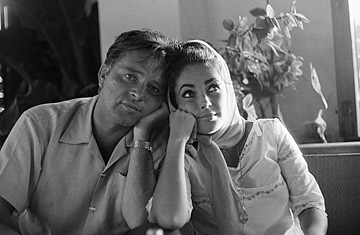
Richard Burton and Elizabeth Taylor on vacation in Puerto Vallarta, Mexico, in 1963
Elizabeth Taylor and Richard Burton, Hollywood's original It couple, had a romance more tumultuous than that of any big-screen drama. They married each other twice and divorced each other twice, perhaps owing to her epic tantrums and his problems with alcoholism. But as newly released love letters from Burton to Taylor attest, despite 20 years of hair-pulling and name-calling, he loved her until the very end of his life.
"I am forever punished by the gods for being given the fire and trying to put it out," the actor wrote in 1973, around the time of their first separation. "The fire, of course, is you." In another letter, written after one of their splits, Burton admits that he hasn't been the perfect husband but suggests that love should triumph over their differences: "You must know, of course, how much I love you. You must know, of course, how badly I treat you. But the fundamental and most vicious, swinish, murderous, and unchangeable fact is that we totally misunderstand each other ... we operate on alien wavelengths ... I love you and I always will. Come back to me as soon as you can."
Excerpts from the letters will be published for the first time in Furious Love: Elizabeth Taylor, Richard Burton, and the Marriage of the Century by authors Sam Kashner and Nancy Schoenberger. "When I first read the letters, tears came to my eyes because they were so moving," Schoenberger says. "I just knew that I was in the presence of a deep and abiding passion." Taylor, 78, agreed to share the letters in a bid to keep Burton's memory alive. In an age of instant celebrity and reality-TV stars, it's easy to forget the great actors and talents of the past. And it's even easier to forget their very human qualities. "Richard was magnificent in every sense of the word," Taylor says in the book, which comes out June 15. "He was the kindest, funniest and most gentle father. All my kids worshipped him."
The couple, who met in Rome while filming the 1962 film Cleopatra, were both married when they launched into a torrid affair. The paparazzi pounced almost immediately, and the Vatican released a statement condemning their adultery. But even disapproval from the Pope couldn't stand in the way of their love, and Burton's letters frequently drip with passion. "If you leave me, I shall have to kill myself. There is no life without you," he wrote in one. Taylor, at times, turned Burton into a philosopher. "One of these days I will wake up — which I think I have done already — and realize to myself that I really do love," he wrote. "Who invented that concept? I have wracked my shabby brain and can find no answer."
And when he wasn't getting deep, Burton was making cute, addressing Taylor as "Dearest Scrupelshrumpilstilskin" and "Twit Twaddle etc." In a more rueful letter written after they had agreed to separate, he calls her "My Lumps." But the love went both ways, and in sharing one of the letters she wrote to Burton after the couple remarried in 1975, Taylor reveals just how sure (and wrong) she was that they belonged together: "Dearest Hubs, How about that! You really are my husband again, and I have news for thee, there bloody will be no more marriages — or divorces, either. Yours truly, Wife."
The letters weren't only about romance found and lost. In one, Burton admits that he was making movies because of his "desire for money," not a love of the craft. "I have never quite got over the fact that I thought, and I'm afraid I still do think, that 'acting' for a man — a really proper man — is sissified and faintly ridiculous." He praises Taylor — a two-time Academy Award winner — for her passion for acting and skill. "You are probably the best actress in the world, which, combined with your extraordinary beauty, makes you unique," one of his letters says. "When, as an actress, you want to be funny, you are funnier than W.C. Fields; when, as an actress, you are meant to be tragic, you are tragic."
Burton died of a brain hemorrhage in Switzerland in 1984. Days before his death, he penned Taylor a final letter. It arrived at her home in the Bel Air section of Los Angeles shortly after she had returned from his memorial service. Now confined to a wheelchair, Taylor keeps it in her bedside drawer. It's the only letter she is keeping private. But she claims that in it, Burton, 58 when he died, asked if they could give their relationship another chance. "Attentive, loving — that was Richard," Taylor says in Furious Love. "From those first moments in Rome we were always madly and powerfully in love. We had more time but not enough."
And that pain may explain the ongoing intrigue surrounding their romance. "Love in opposition always has a hold on people's imaginations, the idea of star-crossed lovers meant to be together but who encounter difficulties," Kashner, one of the book's authors, says. "The Burton-Taylor love story was a great opera in a way." With the release of their plaintive, passionate letters, cinema's epic lovebirds can finally have their encore.
